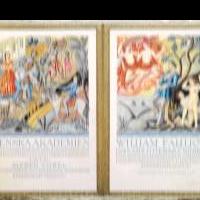The Nobel Prize Explained: 13 Interesting Facts
These are interesting facts about the Nobel Prize: When he signed his last will and testament on November 27th 1895, Alfred Nobel, the inventor of dynamite, invested $237 million in today's dollars in safe securities to create the Prize that could be annually given out to those who contributed the most to mankind in the fields of Physics, Chemistry, Medicine, Literature, and Peace.
The 2014 prize amount was $1.1 m. The Nobel Prize hasn't been awarded every year. According to the rules, if no work from that year meets the criteria, the award money carries over to the next year. The prize went unawarded a total of 50 times, most of them during World Wars I and II.
Most common fields for Physics laureates is particle physics, for Chemistry it's biochemistry, for Medicine it is genetics and for Economics it's the study of productivity aka Macroeconomics. 17-year-old peace prize winner Malala Yousafzai became the youngest Nobel Laureate in 2014, 8 years younger than the 25-year-old physicist who had previously held the title of youngest winner.
The economist Leonid Hurwicz is the oldest, winning in 2007 for his work in game theory. The term “Laureate” comes from Ancient Greece where laurel wreaths were awarded to victors as a sign of honor in both athletic and poetry competitions.
Each Nobel Diploma is a unique work of art, created by Swedish and Norwegian artists and calligraphers.
Two Nobel Laureates have declined the prize. Jean-Paul Sartre (Zahn Paul Sartruh), the existentialist, consistently declined all official honors, including the 1973 Nobel Prize in Literature.
Le Duc Tho (Lay Duck Toe), the Vietnamese revolutionary, was awarded the Peace Prize with US Secretary of State Henry Kissinger in 1973 for negotiating the Vietnam peace accord, but refused in protest because the United States and Saigon had violated the ceasefire terms. Four Laureates were forced to decline the prize.
Adolf Hitler forbade Germans Richard Kuhn, Adolf Butenandt and Gerhard Domagk from accepting the prize. Boris Pasternak, the 1958 laureate in literature initially accepted, but was later forced to decline the honor by authorities from his home country, the Soviet Union.
Three laureates have been under arrest at the time of the award.
German pacifist and journalist Carl von Ossietzky was accused of treason after he exposed Germany's rearmament which violated the Treaty of Versailles; Burmese politician Aung San Suu Kyi was placed under house arrest after leading her pro-democracy party to victory against the Burmese military junta; and Chinese human rights activist Liu Xiaobo for writing the Charter 08 manifesto calling for China to drop its authoritarian system of government.
Four people have been awarded the prize twice: Marie Curie, John Bardeen, Linus Pauling, and Frederick Sanger.
Pauling is the only person to have been awarded two unshared Nobel Prizes. The International Committee of the Red Cross has been honored with a Peace Prize three times and it's founder, Henry Dunant, was separately awarded the first Peace Prize in 1901. Thanks for watching.
For TDC, I'm Bryce Plank.

